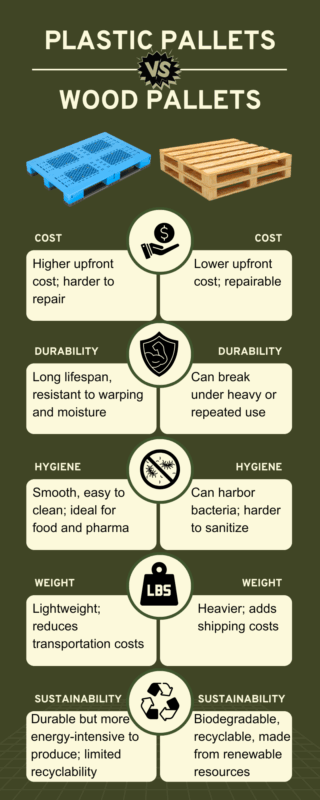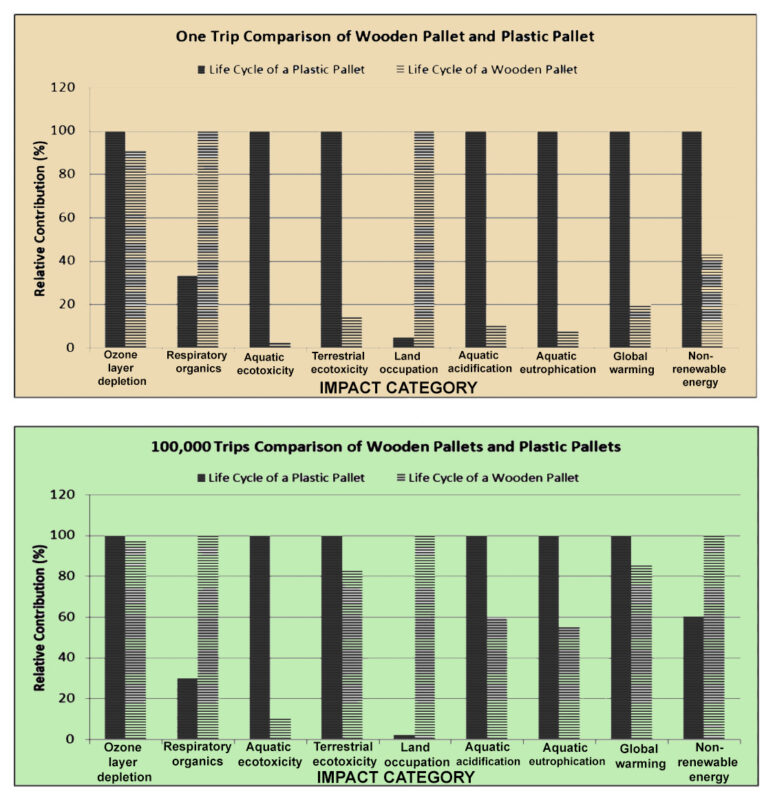Wood vs Plastic Pallets: Pros, Cons and Which is More Cost-Effective
Wood pallets remain the preferred choice for many businesses, offering a clear cost advantage over plastic, often priced up to three times lower, while providing durability and reliability. That said, companies choose both wood and plastic pallets for a variety of reasons and having a clear understanding of their pros and cons can sometimes change which pallet is the best fit for a specific operation. This guide breaks down wood vs plastic pallets, exploring cost comparisons, lifespan, durability and sustainability considerations, giving you the insight needed to make the most informed choice for your business.
Wood vs Plastic Pallets: Key Differences
Wooden pallets have been the industry standard for decades, offering low initial cost, widespread availability, and proven reliability. In the food industry, including grocery stores, GMA-standard 48”x40 wood pallets are commonly used because they are strong, easy to handle, and can be properly heat-treated or sanitized to meet hygiene standards. While plastic pallets are sometimes used in applications where repeated washing or strict hygiene is required, wood pallets remain a versatile and trusted choice across food distribution and retail operations.
Wood vs Plastic Pallets Cost
Wooden pallets generally cost between $10 and $25 each, whereas plastic pallets are priced higher, typically ranging from $40 to $120. While wood pallets are more affordable upfront, their lifespan is shorter—often just a few years—and they can require frequent repairs or replacements. In contrast, plastic pallets last considerably longer—around 8 to 15 years—and are resistant to moisture, pests, and cracking. Ultimately, the most cost-effective option depends on factors such as your budget, shipping distance, product sensitivity, and whether your operation uses a closed-loop system that allows for repeated pallet reuse.
When comparing the cost of plastic pallets vs wood pallets, wood clearly has the edge for low-budget operations. While plastic pallets may reduce long-term maintenance costs due to their durability, the upfront investment is significantly higher. For businesses focused on initial cost savings, wooden pallets remain the preferred choice. Moreover, the end-of-life cycle for wooden pallets is far cheaper, as they are easy to recycle and virtually none end up in landfills. In contrast, plastic pallets are much harder to recycle—nearly 90% of damaged plastic pallets still end up in landfills due to limited recycling facilities and higher processing costs. Since a standard plastic pallet weighs about 15–25 pounds, landfill disposal costs, on average, amounts to roughly $0.40–$1.25 per pallet, not including transportation or handling fees, further increasing the hidden costs of plastic.
Sustainability: Wooden vs Plastic Pallets
Sustainability is increasingly important in supply chain decisions. Research from Penn State University (2023) shows that wood pallets have a smaller environmental footprint than plastic when responsibly sourced. Wooden pallets are:
- Biodegradable and recyclable.
- Made from renewable resources.
- Easier to repair and reuse.
At Performance Pallet, we source wood from SFI-certified forests, repair and recycle pallets, and maintain a circular economy approach. While plastic pallets are reusable, the hidden environmental costs—including energy-intensive production and low recyclability—make wood the more sustainable option overall.
Weighing in on a debate that has raged for decades, Penn State researchers, after conducting a series of ultra-detailed comparisons, have declared that shipping pallets made of wood are slightly more environmentally friendly and sustainable than those made of plastic Penn State University, 2023.
At Performance Pallet, sustainability isn’t just a goal—it’s embedded in our daily operations. This recent study underscores a principle we’ve stood by for years: responsibly sourced wooden pallets not only support a circular economy, but they also provide measurable environmental benefits.
What the Research Shows
The Penn State study compared the life cycles of wood and plastic pallets by examining multiple factors including greenhouse gas emissions, total energy use, water consumption, and environmental impact across several end-of-life scenarios. The findings revealed that wooden pallets generally had a smaller carbon footprint than their plastic counterparts.
Researchers analyzed 12 environmental impact categories and modeled 3 billion pallets used annually in the United States. Despite plastic pallets being reusable and durable, the wood variants—when managed sustainably—proved to have a lower overall environmental impact. The study even emphasized that sustainably sourced wood pallets, especially those from certified programs like SFI (Sustainable Forestry Initiative), performed even better in eco-assessments Penn State University, 2023.
Why Wooden Pallets Matter
Wooden pallets offer a number of advantages:
- Biodegradable and recyclable
- Made from renewable resources
- Easier to repair and reuse
- Sourced from sustainably managed forests
At Performance Pallet, we only work with SFI-certified loggers, ensuring every piece of wood used meets today’s standards for sustainability without compromising future resources. We also reclaim, repair, and recycle pallets—reducing waste and keeping materials in use for as long as possible.
Moving Forward with Smart Sustainability
Plastic may appear durable, but the hidden environmental costs—such as fossil fuel dependence and low recyclability rates—add up over time. Meanwhile, wooden pallets, especially those that are heat-treated and reused, align more closely with circular economy goals.
With over 3 billion pallets circulating in the U.S. supply chain, choosing a wood-first strategy, backed by research, can drive a significant shift toward greener logistics.
Final Thoughts on Wood vs Plastic Pallets
As the Penn State research shows, when it comes to environmental impact, wooden pallets take the lead—albeit slightly. That slight edge, however, can create massive ripple effects across industries. At Performance Pallet, we’re proud to be part of that movement, offering eco-friendly pallet solutions that prioritize people, planet, and progress.
Get Expert Advice on Wood Pallets
Looking to reduce your environmental footprint while keeping your supply chain running smoothly? Contact us today to request a custom quote for sustainable, reliable pallet solutions that make a difference.
Sources
Penn State University. (2023, October 24). Wooden or plastic pallets: Which are more eco-friendly? https://www.psu.edu/news/research/story/wooden-or-plastic-pallets-which-are-more-eco-friendly



